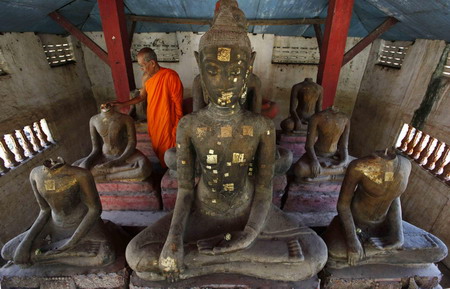Asia-Pacific
Thai police vow crackdown on Buddha statue thieves
(Agencies)
Updated: 2009-11-26 16:19
AYUTHAYA, Thailand: Thai police promised to get tough with criminals who steal historic artefacts for the international market after a spate of thefts from the old capital of Ayuthaya outraged the public in the Buddhist country.
At least 20 heads of Buddha statues have recently been reported stolen from temples in the World Heritage province of Ayuthaya, which was the kingdom's capital from 1350 to 1767, said deputy national police chief Jongrak Juthanond.
"We believe there is a rise in demand in the antique markets abroad where people like to decorate their living rooms with these images," Jongrak told Reuters, a day after he visited the province.
| ||||
"It's already sinful to steal from temples. It's much worse to steal ancient relics," Jongrak said. "The thieves are cursed and those who buy them are cursed, too."
The latest case on Monday involved the theft of six Buddha statues from Wat Thammasinsopa temple in the province, about 90 km (56 miles) north of Bangkok. Some of the images were nearly 300 years old.
In another incident on November 19, seven heads of sandstone Buddha images were stolen at Wat Dong Wai, according to police.
"When the monks woke up for morning prayers, it was still dark and we didn't notice anything until we found the dogs dead. They poisoned the dogs in the middle of the night before stealing the statues," Phra Athikansadaeng Premasilo, the temple's 77-year-old abbot, told Reuters.
"Villagers are naturally very upset about this."
Responding to the public outcry, Jongrak was reported as saying the police would use force if thieves resisted arrest.
"You could see thieves lying dead next to Buddha statues that have had their heads cut off," he told reporters, although he stressed to Reuters that such force would only be used if suspects tried to escape or fought back.
The theft of temple artefacts carries a jail term of up to 15 years.
Headless statues are a common sight among temple ruins in the old capital although the plundering often dates back centuries.
The authorities are monitoring the online trade of Buddhist relics and artefacts that may have been smuggled out of the country, Jongrak said.
These images and other pieces of Thai art have been sold illegally abroad in recent decades, usually by Thais who pillaged ancient archaeological sites, Khemachai Thepchai of the government's Fine Arts Office told Reuters.
Once a relic has been smuggled abroad and then sold through legal channels, it becomes all the harder to recover it.
"That makes it very difficult for us to make official complaints and bring them back," Khemachai said.












